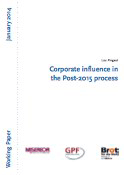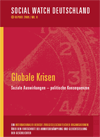Germany
Published on Mon, 2014-03-03 15:43
In a new working paper entitled "Corporate influence in the Post-2015 process" GPF's Lou Pingeot discusses the influence of transnational corporations in the Post-2015 process. This working paper by Brot für die Welt, Global Policy Forum and Misereor provides an overview of the main corporate actors in the post-2015 process and how they shape the discourse on development. The paper advocates for more transparency around the participation of corporations in UN processes, including their financial support to UN initiatives, and for more reflection on the risks of a corporate, private interests-driven development agenda. |
Published on Tue, 2013-04-23 14:01
The UN has launched an extensive worldwide discussion on the new development agenda that is to succeed the Millennium Development Goals in 2015. Jens Martens, long-time observer of international development and environmental policy, cautions in an interview against consultation overkill and calls on NGOs to develop alternatives that go beyond what is currently politically feasible. |
|
Published on Mon, 2012-03-19 08:50
In terms of gender equity Germany places itself well above the European average, but below the Nordic countries and Spain. |
|
Sustainable development in general seems to be widely accepted in the country. A more detailed look however shows that there is still some resistance. Climate change is not properly addressed, and renewable energy sources are still reliant on subsidies from the Government and consumers. Moreover, these subsidies are being reduced, particularly for solar power, while the operating life of nuclear plants is being extended. In addition, the budget item for economic compensation to countries affected by climate change has been deleted from the 2011 draft budget. Meanwhile, the gap between rich and poor is growing and social policies are not fully implemented.
|
|
The change of government resulting from the 2009 elections has yet to produce any benefits for the poor or others affected by the financial crisis. No new direction is discernable in the labour market or in social policy, and the impoverishment of large sections of society is continuing. Moreover, environmental issues have played a very minor role in the Government’s response to the crisis. According to World Wildlife Fund, only six out of the 32 stimulus measures had a positive impact on the environment, and just 13% of them can be considered sustainable.
|

Wirtschaftliche Phänomene beschreibt man gerne mit Metaphern, die mit Wasser zu tun haben: Geld »fließt«, Wohlfahrtsgewinne »sickern« zu den Armen durch, Geld»quellen« »sprudeln« oder »versiegen«, Kapital »strömt« …
|
Published on Tue, 2009-11-17 15:01
Wednesday 18 November 2009, 10:30. In view of global crises, human rights must be enforced against economic interests! This Wednesday 18 November, the Germany Social Watch Report 2009, Globale Krisen – Soziale Folgen und politische Konsequenzen (Global Crises - Social impact and political consequences) will be launched in the Convention center in the building of the Federal Press, Room 0107 |
SUSCRIBE TO OUR NEWSLETTER








